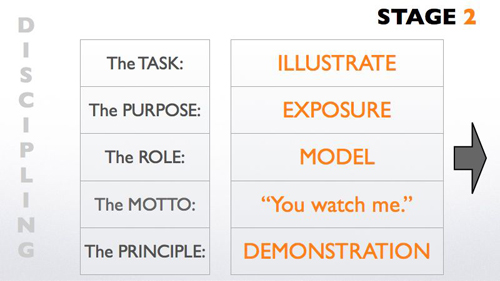Stage Two - Illustrate
Series | Making Disciples
Making disciples requires instruction, but verbal communication isn’t the end of the process. Now we come to Stage Two.

Teaching others the truth is crucial. So is practicing it in front of them. Therefore our second TASK is to illustrate; to put instruction on display. The PURPOSE is exposure to the difficulties and delights of being a disciple. Our Lord left us an example in order for us to follow in His steps. Likewise, we are to live as examples for our disciples to watch.
A master trains his apprentice both by telling him what to do and by showing him how to do it. We take the same hands-on, eyes-on approach. Therefore in Stage Two the ROLE of the disciple-maker is that of a model. Our MOTTO is “You watch me.”
At least two benefits come from disciples seeing their discipler’s personal obedience. First, they see how it’s done. But second, the teacher establishes credibility and underscores the believability of the truth. Expecting others to do what we won’t or don’t do undermines integrity. On the other hand, living out the truth corroborates our knowledge and love of the truth. People pay attention when we practice what we preach.
This presumes the “life on life” precept. We cannot make disciples remotely; it requires a relationship. We cannot effectively model–or watch for that matter–from faraway. Living rooms and waiting rooms supplement classrooms. Yes, truth can be taught in a living room. Yes, some life on life occurs in a classroom. But this component of training looks at a discipler’s lifestyle at work and play.
We must spend a quantity of quality time or else our disciples will be ill-prepared. We’re all busy, but Stage Two must be intentionally included at every opportunity. Dinner time isn’t sufficient for diligent parenting. Kids need car rides and late night conversations. Part-time shepherds put the sheep at risk. So discipleship is the product of many moments, but it is never momentary.1
While Christ’s substitutionary atonement is the primary purpose of the incarnation, His life on life discipleship was part of the reason as well. God could have dropped a copy of His Word from the sky instead of sending His Son to earth for so long. Jesus called His disciples to follow Him and to be with Him. They watched Him in public and in private. They saw Him spend nights in prayer, respond to religious authorities, care for little children, teach the masses, heal the sick, and do all sorts of miracles. They observed Him when He was tired, hungry, interrupted, angry, and sorrowful. As the time of His crucifixion came closer He focused more personal attention on His disciples, not less.
The apostle Paul also understood the importance of being a living object lesson. He exhorted the Corinthians, Be imitators of me, as I am of Christ.2 He told the Philippians to keep your eyes on those who walk according to the example and that they should practice what you have learned and received and heard and seen in me.
This stage of discipleship is hardly flashy, not easily evaluated, and often unappreciated. But it is relevant, effective, and as we’ve seen, it was the Master’s plan.
For those who want to grow, listen to good teaching and find a good follower of Christ. Get in their back pocket. Make yourself available to serve them and hang out with them as much as possible. Watch how they respond to everything. Don’t isolate yourself from those who are further down the discipleship road than you.
Christ is life, not class.3 Examples without teaching are useless without knowing what the example is for. Of course, instruction without personal illustration won’t have the same influence. Truth must be proclaimed, believed, and practiced to make disciples.
- Herein is the reason for every retreat we run, why we drive 20 hours to and from the Shepherds' Conference and Preview Weekend at The Master's College, why we have small groups, and why we work to schedule life "path crossings" like running errands, drinking coffee, or scraping gum off the gym floor: to be together. ↩
- I know some people are uncomfortable with the arrogance of asking another person to imitate us. Instead, they say, we should tell everyone just to follow Jesus. That's fine as far as it goes, but exposing our lives and letting others see we're sinners gives us an opportunity to repent and show how that works too. ↩
- By this I do not mean the same thing as those who insist "Christ is life, not doctrine." That's bologna. I went out of my way to say discipleship depends on doctrine in Stage One. I simply mean that formal, corporate learning is only one slice of the discipleship pie, not the whole. ↩